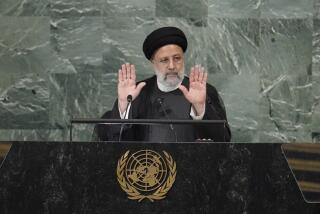Reagan Turns Conciliatory, Praises Moscow on Rights
- Share via
CHICAGO — President Reagan, whose harsh criticism of Soviet oppression prompted a protest from Soviet leader Mikhail S. Gorbachev last month, turned conciliatory Wednesday in a pre-summit speech praising Soviet progress on human rights and acknowledging U.S. shortcomings.
Not only did Reagan “applaud” improved freedom of religion, speech and emigration in the Soviet Union, but he also acknowledged “serious” problems in the United States with homelessness, unemployment and racial discrimination.
“We welcome the human rights progress that the Soviet Union has made--and believe there is good reason to hope for still more,” the President said in outlining a human rights agenda for the May 29-June 2 summit with Gorbachev in Moscow.
His speech to the National Strategy Forum, a nonpartisan foreign policy group, was in sharp contrast to another pre-summit address in Springfield, Mass., on April 21, which detailed how the Soviet Union “oppresses its own people.”
Gorbachev called the remarks “confrontational,” and he and Soviet Foreign Minister Eduard A. Shevardnadze have complained that Reagan has no business criticizing Soviet deficiencies when America has its own.
On Wednesday, Reagan observed during a question-and-answer period after his speech that the spirit of cooperation is “preferable to staging a kind of contest with him so that someone looks like a winner or loser.”
In the speech, the President took note of Soviet progress.
“Over the past three years, some 300 political and religious prisoners have been released from labor camps,” he said. “More recently, the incarceration of dissidents in mental hospitals and prisons has slowed and, in some cases, stopped completely. And while the press remains tightly controlled by the party and state, we’ve seen the publication of stories on topics that used to be forbidden--topics like crime, drug addiction, corruption, even police brutality.”
Reagan cautioned that the changes were “limited” and that basic standards contained in the Helsinki Accords on human rights still are not being met.
“But we applaud the changes that have taken place and encourage the Soviets to go farther,” he said. “We recognize that changes occur slowly, but that is better than no change at all.”
Shortcomings Admitted
At the same time, Reagan conceded that “yes, the United States has social and economic shortcomings,” citing unemployment as an example.
“As a free people, we have created an economic expansion that over the past five years has created nearly 16 million jobs--but we still recognize we need to do more,” he said.
The President called homelessness an “agonizing” problem.
“To some extent, we are bound in dealing with it by our very commitment to liberty--for while we seek to help the homeless in every way possible, we must avoid at all costs coercive solutions,” he said.
However, he added that despite the expenditure of hundreds of millions of dollars by the government, and widespread volunteer efforts to provide food, clothing, medicine and shelter, “there is no denying that a problem remains.”
Addressing the fight against racial discrimination, Reagan noted that “dramatic strides” have been made for three decades. “Yet the problem lingers, and we continue to battle bigotry and prejudice,” he said.
Will Press Gorbachev
The President reiterated that he will press Gorbachev at their summit meeting to relax even further government controls on churches, synagogues, mosques and other houses of worship.
Also on the summit agenda will be freedom of speech. “Today, there is more such freedom in the Soviet Union than two years ago,” Reagan said.
As for emigration, the President observed that, in the last year, the rate of people permitted to leave the Soviet Union was “significantly higher than during the preceding six years. . . . We’re heartened by this progress.”
Aboard Air Force One en route to Chicago, White House spokesman Marlin Fitzwater was asked if Reagan had adopted a softer tone because of the strongly negative Soviet reaction to his last speech.
“I don’t think so,” Fitzwater said, calling Wednesday’s speech “very strong.” The President, he said, was “speaking from the heart.”
More to Read
Sign up for Essential California
The most important California stories and recommendations in your inbox every morning.
You may occasionally receive promotional content from the Los Angeles Times.









